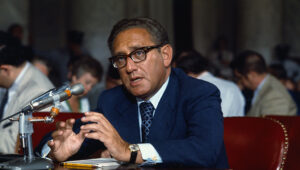In the coming days, many will lavish praise and blame on Henry Kissinger for what he did and did not do. A prime example is the coup in Chile that removed Salvador Allende in 1973, which Kissinger welcomed but did not cause. With thousands of US academics teaching the falsehood of his guilt as truth, Kissinger just had to live with the calumny.
Instead of assigning blame or praise, I will limit myself to personal recollections. Soon after arriving in the US in 1972, to pursue accelerated doctoral studies at Johns Hopkins University (already 27 and married with a child, I had no time to lose), an older London acquaintance, the eminent contemporary historian Walter Laqueur introduced me to his close friend from Berlin, Helmut Sonnenfeldt — then the senior figure on the National Security Council headed by Kissinger. When Kissinger became Nixon’s second Secretary of State in September 1973, Sonnenfeldt became Kissinger’s Counsellor, a role analogous to the “consigliere” of fictional Mafia families (I never heard the term in Sicily, where I grew up). While the job of the Secretary of State is to shield the US from foreign antagonists, the Counsellor’s job is to shield the Secretary of State from his bureaucratic enemies in other departments of government — and, most of all, from his own State department officials.
That Laqueur shared Sonnenfeldt and Kissinger’s uncontrollable passion for the German Bundesliga‘s football teams was an additional bond between the three German Jews, which I failed to share as Laqueur’s sidekick, although I too was a German speaker. While Kissinger didn’t like to hold entire conversations in German, he enjoyed using less translatable German expressions such as Hochstapler, loosely defined as a confidence trickster, and Betrüger, an impostor and deceiver.
That he liked to use those specific words was striking because Kissinger himself was a compulsive liar — a characteristic which does not detract from his huge achievement of “castling” the USSR by turning China from a strategic enemy to strategic ally. Indeed, lying was so much part of Kissinger’s personality that he took no action against Sonnenfeldt when, in a moment of madness, the latter blurted out that Kissinger would lie when he had to, and would keep on lying just to remain in practice for the next occasion when he would have to lie again.
One victim of Kissinger’s lying — all for a good cause, as was most often the case — was James R. Schlesinger, the Rand Corporation strategist who was Nixon’s Secretary of Defense in October 1973, and for whom I soon started working as a day-rate strategist. At the time, a much smaller and weaker Israel was fighting for its life against Egypt and Syria, after being surprised by their simultaneous offensives on 6 October. The badly outnumbered Israelis needed supplies urgently, and Schlesinger promptly ordered the US Air Force’s airlift command to start assembling aircraft and needed the supplies.
But Nixon, fearing an Arab oil embargo, would not give the green light. Instead of arguing Israel’s case with Nixon, as a nice Jewish boy should have done, Kissinger wanted to be a very nice Jewish boy — by holding up the airlift for just a few days, so that Egypt could enjoy its initial surprise attack before Israel’s inevitable counter-offensive. That would, he hoped, improve the chances of the Egyptians agreeing to a “peace of the brave”, instead of more of the bitterness caused by Israel’s crushing 1967 victory.
Kissinger’s calculation proved to be accurate, and the peace he engineered by delaying America’s supplies lasted for half a century. But in those red-hot days of October 1973, it was a huge embarrassment for Kissinger to hold up the airlift, so he circulated the rumour that Schlesinger was to blame. As it turned out, when Nixon finally ordered the airlift after Golda Meir’s entreaties, fully stocked C-5 aircraft took off almost from Dover Air Force base — thus proving that Schlesinger, far from dragging his feet, had ensured that both aircraft and supplies would be ready to go as soon as White House approval arrived. By then, however, Kissinger’s lie had become Washington’s truth.
This had serious consequences, making Schlesinger so unpopular that a small intrigue was enough to persuade President Ford to fire him in 1975. When Laqueur and I wrote an article revealing the truth about who did what in October 1973, Kissinger was not seriously irritated — he just called us “partners in crime”.
But the Kissinger-Schlesinger quarrel was also about something altogether larger than the 1973 airlift: détente with the Soviet Union, which was Kissinger’s most important policy creation and which Schlesinger fiercely opposed. He was still in office when it culminated in the Vladivostok Summit Meeting between Secretary General Brezhnev and President Ford in November 1974, in which the two sides finally agreed finally agreed to exact numerical restrictions on each side’s nuclear weapons, and — even more importantly — also agreed to manage all future conflicts jointly, even if that would offend their respective allies.
The Vladivostok summit was Kissinger’s apotheosis. It sealed his détente policy with the Soviet Union — and, in the meetings, it was very obvious that Brezhnev relied on Kissinger to guide him more than he relied on his own foreign minister, Gromyko, by then in his 18th year in office and a dried-up prune. It was just as obvious that Ford was out of his limited depth, and that Kissinger was telling him what to do and say every step of the way. Considering that Kissinger was concurrently going in and out of Beijing with as much or as little ceremony as he wanted, in his final days in office he seemed to be more than just the US Secretary of State, but the world’s statesman.
But Vladivostok was also his downfall. Even before Jimmy Carter, the next President, repudiated all his policies by prioritising human rights over détente with Moscow or amity with Beijing, his own President Ford had to promise that he would not re-appoint Kissinger if re-elected: the backlash against his conviviality with the world’s most powerful dictators was just too strong.
After that, Kissinger mostly kept in touch by sending me (and many others) every article he wrote. The most recent was from just a week ago: a letter on the dangers and promise of artificial intelligence co-authored with Graham Allison. By contrast, when we did occasionally meet, mostly at Manhattan dinner parties, he avoided any serious conversation. He would invariably turn into the other Kissinger, the gossip-loving society figure, who never talked of his money-making Kissinger Associates or anything else of substance.
That he died at the age of 100 is more extraordinary than many realise: I was in frequent contact with him soon after his quadruple bypass surgery in February 1982. Back then, his surgeon confidently gave him another 10 years.
Disclaimer
Some of the posts we share are controversial and we do not necessarily agree with them in the whole extend. Sometimes we agree with the content or part of it but we do not agree with the narration or language. Nevertheless we find them somehow interesting, valuable and/or informative or we share them, because we strongly believe in freedom of speech, free press and journalism. We strongly encourage you to have a critical approach to all the content, do your own research and analysis to build your own opinion.
We would be glad to have your feedback.
Source: UnHerd Read the original article here: https://unherd.com/



